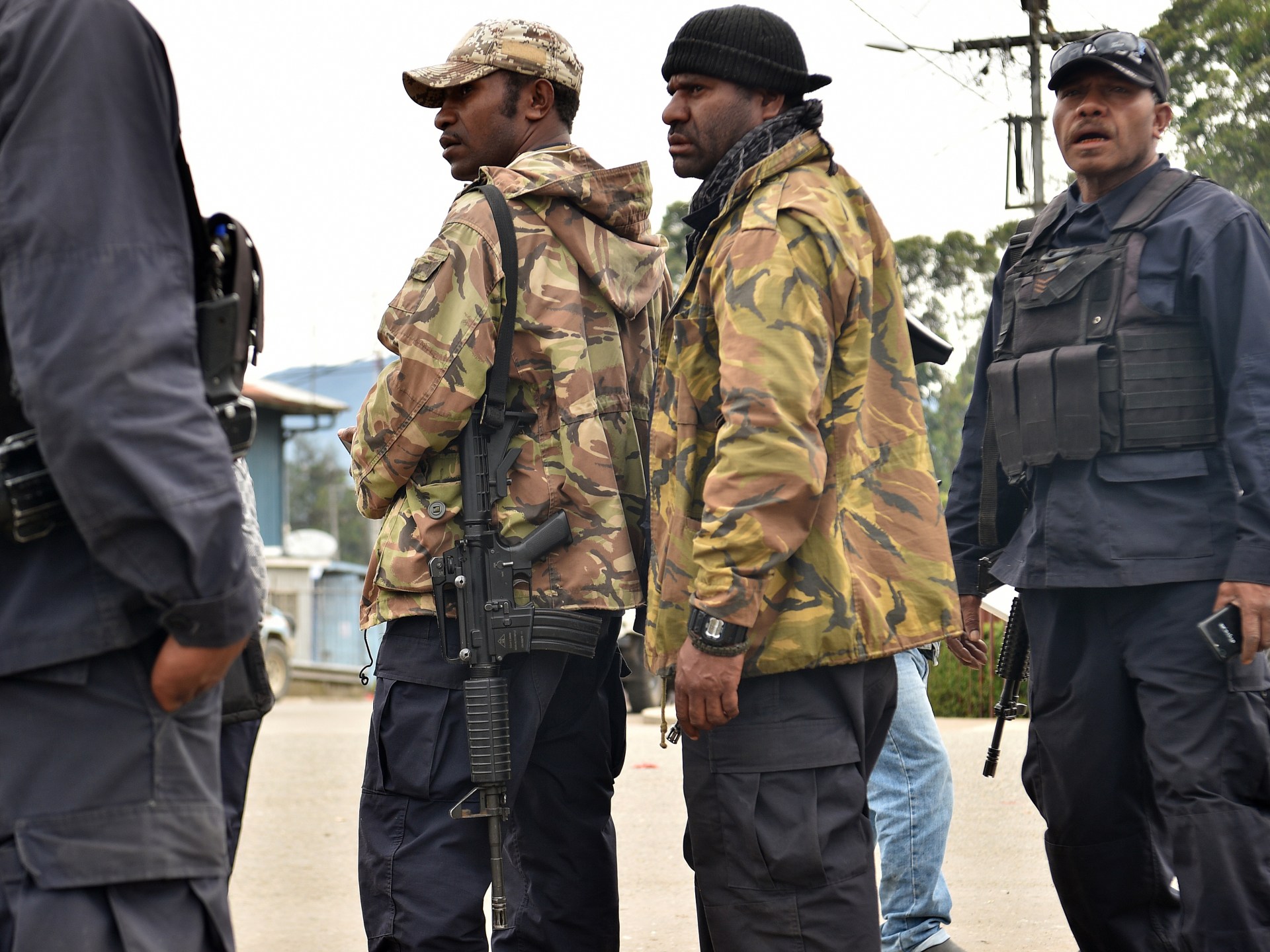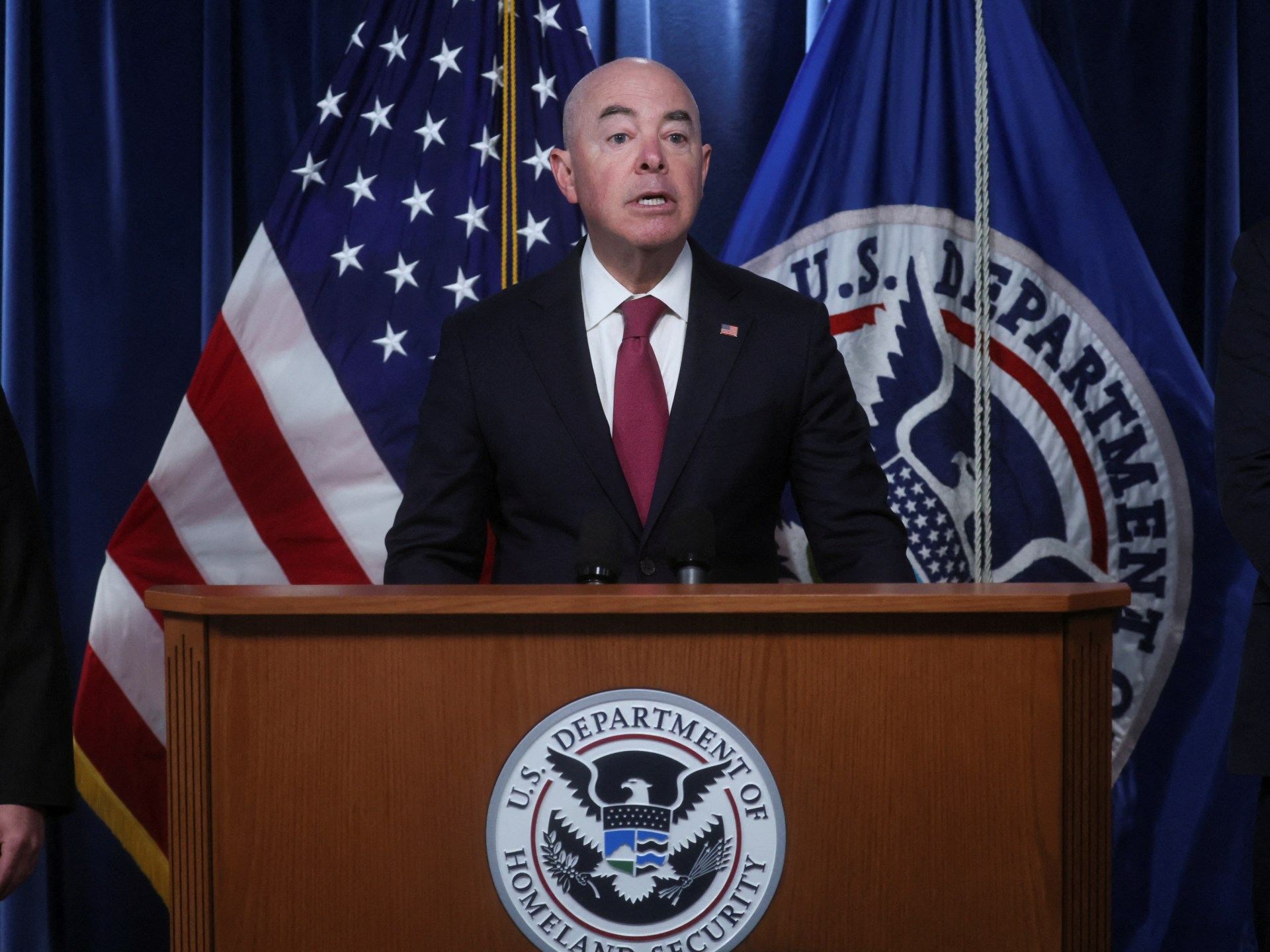In New York, Israeli conscientious objectors find community after ostracism
New York, United States – He feared being called a “mishtamet”. A draft dodger. Someone who shrinks from their responsibility.
But at age 17, Jewish social worker Asaf Calderon made a fateful decision: not to participate in the mandatory military service required of nearly all Israeli citizens.
Instead, he pursued and was granted a medical exemption for mental health reasons. Still, his choice came with a cost.
A soft-spoken man with round glasses and a tender smile, Calderon, 34, noticed that, afterwards, his friends started to seem distant. Members of his family fell out of contact.
He realised his decision had left him a pariah in Israel, even among his loved ones. He eventually moved away to New York City.
“It doesn’t matter why you do it,” Calderon said of becoming a conscientious objector, someone who refuses to participate in military service on ethical or moral grounds. “You are going to get ostracised in a way.”
But the war in Gaza has amplified the pressures he and other conscientious objectors face. Since October 7, Israel has led a military campaign in the Palestinian enclave, with ground forces and aerial bombardment levelling entire neighbourhoods.
The offensive follows an attack on southern Israel that killed an estimated 1,200 people. The subsequent war, however, has left more than 30,000 Palestinians dead, many of them children. United Nations experts have warned of a “risk of genocide”.
“The main thing that I’ve been told ever since the war started, by Israeli people who oppose me, is that I have lost my Israeli-ness. That I’m no longer Israeli,” Calderon told Al Jazeera.
Then came Shoresh. Founded in the United States at the end of November, partly in reaction to the war, the group aims to promote anti-Zionism from the viewpoint of Israelis themselves.
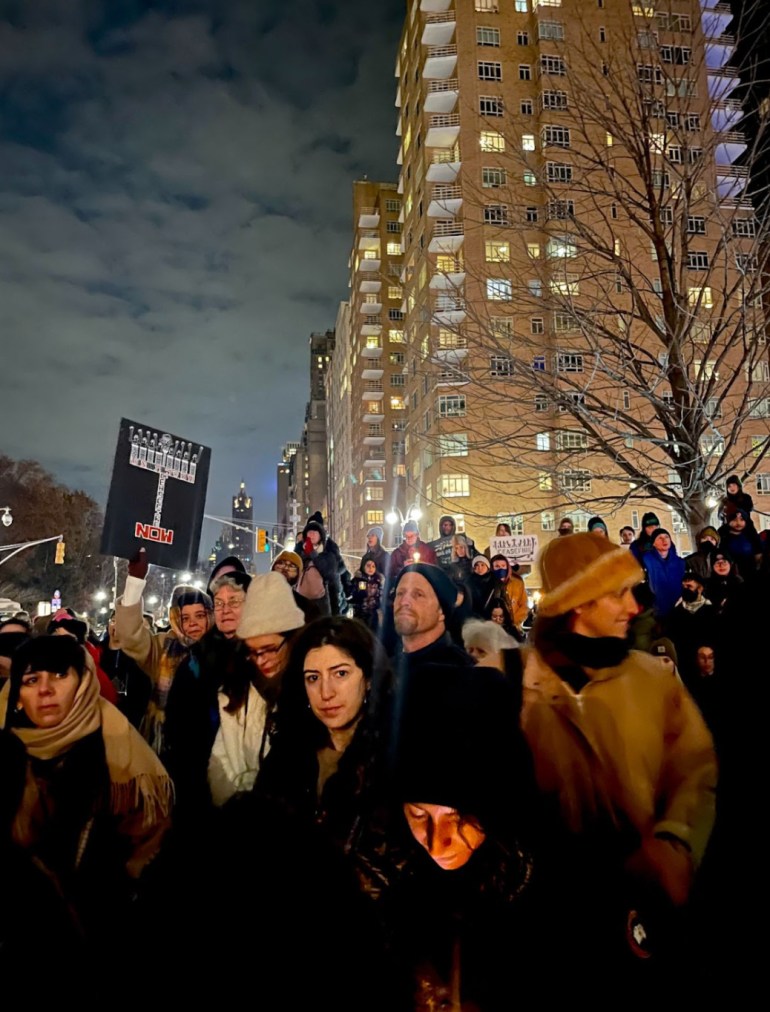
There, Calderon met others who avoided Israeli military service through roundabout means — or applied for official status as conscientious objectors. It gave him a sense of community that he struggled to find elsewhere.
Guy Erez, who has attended Shoresh events, described joining the group as an antidote to the isolation. “Oh my God,” he remembers thinking. “Somebody gets it. Thank God I’m not crazy.”
A tradition of mandatory military service
There are no official statistics about the number of conscientious objectors in Israel — in part because there is no single profile of what a conscientious objector is.
Some, like the members of Shoresh, are anti-Zionists, critical of Israel’s founding as a Jewish nation-state. Others, particularly in Orthodox Jewish communities, object to military service for religious reasons.
Still more oppose certain military activities they might be called upon to perform, like assignments that take them into the occupied Palestinian territories.
The history of mandatory military service — and refusing to comply — goes back as far as Israel itself. In May 1948, shortly after Israel declared independence, its government founded a conscription-based military, drawing largely from existing militias and paramilitary forces.
By the following year, though, mandatory service had become cemented in Israeli law. Today, once Israeli men turn 18, most are expected to serve 32 months in the military. Women, meanwhile, serve 24 months.
Broad exceptions are carved out for certain Palestinian citizens of Israel, religious groups, married people and “those deemed unfit medically or mentally”.
And conscientious objectors can also apply for an exemption before a special military committee. But critics argue relatively few applications are granted, outside of religious grounds or proven track records of pacifism.
Without such an exemption, the consequences of rejecting military service can be severe. Israel’s Defence Service Law stipulates that a citizen’s failure to fulfil their military duty can result in up to two years’ prison time.
If they intentionally “injure or maim” themselves in the process, that prison sentence can jump up to five years.
Since the war in Gaza began, an 18-year-old named Tal Mitnick has become the highest-profile instance of military refusal. He surrendered to the Tel Hashomer military base in December for a 30-day sentence.
“I believe that slaughter cannot solve slaughter,” he said in a video recording, before walking inside.
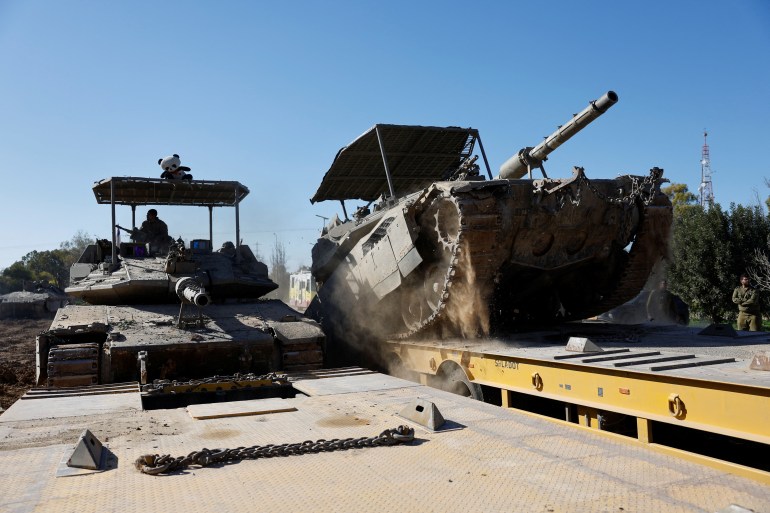
Refusing in solidarity with Palestinians
The Israeli-Palestinian conflict has long been a motive for “refusers” — or “seruvnikim” — like Mitnick to reject military service, even before the current war began.
In 2014, for instance, reserve soldiers with Unit 8200, a secretive intelligence group, penned an open letter to Prime Minister Benjamin Netanyahu, refusing to take part in Israeli military actions involving Palestinians.
“There’s no distinction between Palestinians who are, and are not, involved in violence,” the reservists said of the military’s actions.
The military’s “intrusive supervision”, they added, “does not allow for people to lead normal lives and fuels more violence, further distancing us from the end of the conflict”. Their public refusal was believed to be the first of its kind for Israel’s intelligence community.
But Netanyahu has long pledged to take a firm stance against so-called “refuseniks”.
Last year, when military reservists threatened to shirk their duties in protest of his government’s far-right reforms, Netanyahu threatened a crackdown: “The government will not accept refusal to serve.”
Like many Israeli children, Roni Zahavi-Brunner — another member of Shoresh — grew up never questioning the requirement to serve, even though her family was relatively progressive. It wasn’t until she went to a boarding school in Italy that her perspective changed.
Some of her classmates were Palestinians. Zahavi-Brunner came to know their struggles intimately, as they lived day in and day out together.
“We were all 16, and yet they all had so many scary interactions with the [Israeli] military at such a young age,” said Zahavi-Brunner. “And I realised that that’s not something that I’m really willing to take part in.”
One classmate became a close friend. Originally from Gaza, she confided with Zahavi-Brunner about the difficulties she faced even reaching the school.
“She was talking to me about what her experience was like getting out of Gaza to get to Italy, and all the processes that she had to go through with the soldiers at the border,” Zahavi-Brunner recalled. “All the interviews and investigations and questioning by the military when she was 15, and how scary that was for her.”
The story was eye-opening for Zahavi-Brunner. It shifted her opinion of the Israeli military.
“I realised that at that point, it doesn’t matter who that soldier is. It doesn’t matter if they’re the nice soldier or the non-nice soldier. The experience is the same, and the power dynamic is the same. And that shouldn’t be something that exists as a whole.”
She credits the lack of awareness she had as a child to Israeli-orchestrated “segregation”.
“It’s not very normal to meet or to have conversations [with Palestinians], and that’s very much on purpose,” Zahavi-Brunner explained.
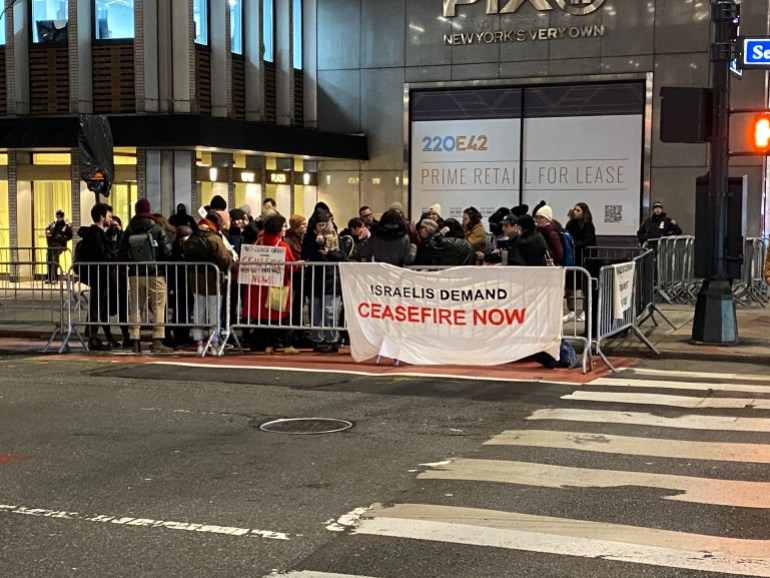
Zahavi-Brunner, now a 24-year-old student and climate justice campaigner, speaks with the sharp assurance of someone who knows what she stands for. She ultimately applied for — and received — a government exemption as a conscientious objector.
“I definitely lost some friends because of that, at the time,” she recalled.
Not only did her decision lead to a sense of isolation, but it also weighed against her job prospects in Israel. Though employers are legally not allowed to ask a job candidate why they did not serve, Zahavi-Brunner said it happens anyway.
Many applicants even advertise their military service on their resume, she added.
But despite the ostracism and threat of professional repercussions, Zahavi-Brunner found a new sense of community through activism. When she decided to refuse her military service, she was aided by an Israeli activist group called Mesarvot, a Hebrew word that translates to the feminine form of the word “refusers”.
“A lot of members of Mesarvot end up going to prison for a few months,” she said matter-of-factly. “One of my best friends ended up going to prison for three or four months, for refusing to serve.
Now living in Brooklyn, Zahavi-Brunner joined Shoresh partly with the aim of dispelling preconceptions about Israelis — namely, that they are a monolith, lockstep in support of their government.
Not all Israeli citizens share the same beliefs, she pointed out, and many feel the current far-right government does not represent their ideals. She believes organisations like Shoresh help create space for voices like hers.
“People still sort of tend to look at Israel as just this like one entity, and not actually at society and the different aspects and communities within the society in Israel,” Zahavi-Brunner said.
“And it is really, really scary to be against the war in Israel right now. People are getting arrested for standing with signs on the street. People are getting arrested for their Facebook posts.”
Layla Klinger, one of the organisers behind Shoresh, said the group’s “largest goal” is “the end of the apartheid” Israel is inflicting on Palestinians. But representing the diversity of Israeli viewpoints is also a goal Klinger shares.
“In the shorter term, I think what’s really important is to inject Israelis into the discourse,” Klinger said.
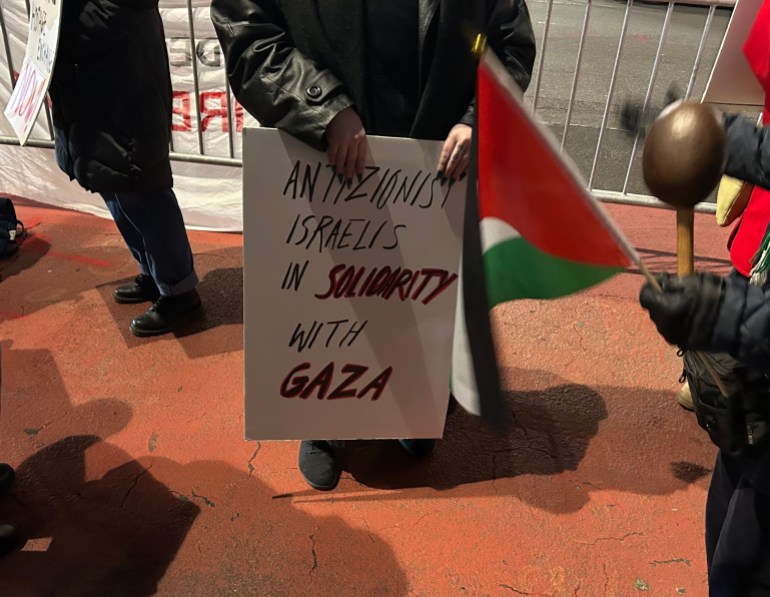
Finding roots even abroad
Shoresh’s base in New York — thousands of miles from Israel — has helped facilitate that discourse. Erez, for instance, said that while pushing for peace is always “complex” and “uncomfortable”, being far away allows him to speak out in ways that he could not in Israel.
After all, human rights advocates have criticised Israel for using hate speech and anti-terrorism laws to suppress pro-Palestinian and anti-government protests.
The one downside, Klinger and others said, is that — without American citizenship — some Israelis risk consequences to their immigration status if they participate in civil disobedience on US soil.
Klinger described feeling forced to hang back at a recent protest, designed to disrupt an event in support of the Israeli military. Klinger only has Israeli citizenship and is in the US on a temporary status. Going inside — and possibly getting arrested — might have endangered Klinger’s ability to remain in the country.
“The people going in are people with citizenship, and I was still on the outside, which was really shameful because I really want to be inside,” Klinger said.
But being in New York has been liberating for other Israeli conscientious objectors. As a child, for instance, Calderon remembers feeling pressure to keep his opinions to himself. A philosophy teacher even arrived at his school to speak to his class about the ethical consequences of not serving in the military.
According to Calderon, the point of the lesson was to show that, if you don’t serve, then you are selfish. But the message came across as overwrought and dogmatic.
“If I’m being pushed that badly to do something, it’s probably wrong,” he said with a bitter laugh.
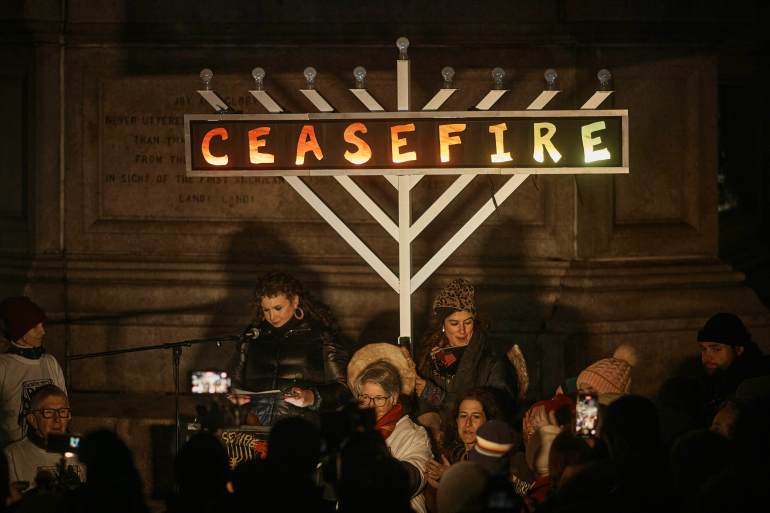
Through Shoresh, however, he has found fellow Israelis who share his rejection of the country’s military actions — a rejection controversial in Israel, but less so overseas. On a frigid December evening, he and other members gathered together to celebrate the start of Hanukkah, the eight-day Jewish festival of lights.
Alongside cups of hot cocoa and candles, they held up signs with messages like, “More carnage is not the answer”. An enormous menorah they set up blazed with the colours of the Palestinian flag. It was inscribed with one word: “ceasefire”.
Still, even as he spoke to Al Jazeera, Calderon expressed concern over how he might be perceived back home.
“I know that people are gonna read this and think that I have lost my love for my people, my loyalty to my people,” said Calderon. “And it’s not true. Everything I do, I do out of love for my people, for the Palestinian people, and for a better future for our country.”
After all, the word Shoresh points to something fundamental for Calderon: In Hebrew, it means “roots”.


